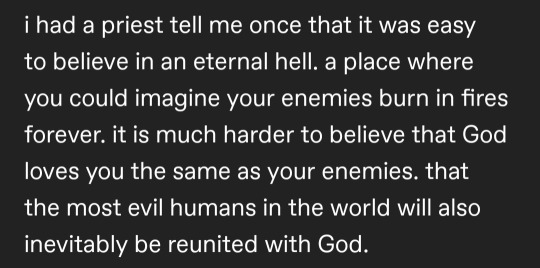#the shechinah
Explore tagged Tumblr posts
Text

.וְהִיא שֶׁעָמְדָה לַאֲבוֹתֵינוּ וְלָנוּ
"And She is the One who stood for our forefathers and for us."
[Pesach Haggadah]
וַיּוֹצִאֵנוּ ה' מִמִ��ְרַיִם בְּיָד חֲזָקָה, וּבִזְרֹעַ נְטוּיָה, וּבְמֹרָא גָּדֹל, וּבְאֹתוֹת וּבְמֹפְתִים.
"And G-d took us out of Egypt with a strong hand and an outstreched arm, and with great awe, and with signs and with wonders."
[Deuteronomy, Ki Tavo, 26:8]
Thinking about how the One who Stood (Hashem) in V'Hi Sh'Amda in the Haggadah is referred to as "She".......
[id in alt text]
142 notes
·
View notes
Text
Because this generation is serving as the midwife for the rebirth of the Shechinah, we will have to be familiar with the ancient knowledge and traditional prayers which invoke her, at the same time that we are creating new forms. In this ancient/future subculture we will need poets and prophets, rebels and rabbis, musicians and mothers.
What is clear is that we have the beginnings of a movement without a hierarchy, a central leader, or a single organization.
This Goddess who shines on us as we study sacred texts is found in redwood groves and apple orchards. She is coming to us in the wind and the water, in the ocean and the mountains. Like the underground Goddess herself, this movement comes from the subterranean parts of the human psyche. It emerges from a place of discovery and awe, from a place of wonder and worship.
Rabbi Léah Novik, collected from The Goddess Re-Awakening collection by Shirley Nicholson
Note that "Shechinah" means, literally, "the presence of God" and it is a multifaceted concept in the Talmud, in Midrash, and in the Mishnah. Rabbi Novik's points are, I think, applicable to a lot of Goddess-oriented activities, but the words "Shechinah" and "Goddess" are not interchangeable.
#soulstead-sanctuary#gatekeeper-of-witchcraft#jewitch#goddess#the great goddess#witchblr#pagan ish#women's voices#quotes#shechinah#food for thought#women's liberation
11 notes
·
View notes
Text

SHECHINAH: You two never listened to me. Know look at where you are! HAH!
BITACHON: We never listened to you because of the nuclear fluid seeping into your body, Shech. It's that simple.
SHECHINAH: Bitachon... you couldn't even save your little friend from Izhitsa. It's all your fault that Sumach is buried underground.
TEMIMUT: (uuhh,, should i?)
BITACHON: (murder that bitch now.)
TEMIMUT: (okay!!)
SHECHINAH: What are you whispe-

#silly little smilers :D#original character#oc#a bit of lore#art#we havingment:#bitachon (original)#temimut#and#shechinah#amazing!!
2 notes
·
View notes
Text
To be a ger is to be always a foreigner everywhere you go.
"Ger" literally speaking, meant "foreigner" or "stranger" before it ever meant "convert," and in some texts still means that. Famously the Jewish people is described as being "gerim" in the land of Egypt. Does that mean we were converts in Egypt? No. We were foreigners - strangers whose rights were easily taken away and oppressed, and this is why we are commanded to be kind to foreigners. But there is the rabbinic double meaning of "convert," and the Jewish people is commanded to love converts as well.
But I would argue that there is an element of foreigness to our conversions as well. We are always in some ways immigrants to Am Yisrael. For some of us that may simply have been the experience of it being a paperwork issue, and culturally you have always been at home here.
But for many gerim, we come from outside. We come for any number of reasons, finding our way here through the intuition of our neshama, by chance or by luck, by family or friendship, by allyship, by exposure to Torah or exposure to the Shechinah - or any combination of the above and more.
But we come to the Jewish people asking for shelter and connection. Some of us come with a whole pedigree of Jewish studies and deep prior connections, and some of us come as refugees from other faiths and cultures, with nothing but the spiritual shirt on our backs and dreams of a better future.
And over time, we assimilate. We readily learn the culture and the language and the customs. We learn to cook the food and to follow the laws. We change our clothes to fit with our community and we move to the neighborhood where the other Jews live so we can walk to shul. We reshape ourselves into yiddishkeit and work hard to naturalize.
And eventually we do! We become part of the fabric of the Jewish people forever - having changed our whole lives and changing the shape of the Jewish people in turn. But our roots always lead back to this process. That's not a bad thing or a lack of authenticity - just take a look at the stories of naturalized citizens and you'll see the pride and strength they bring to their new nation. Even so, we are, and always will be, foreign immigrants to this community. Our Hebrew will always have an accent. Our background will lack many of the early milestones that other Jews experience. Our stories and relationships to our families will always be different. You will feel that sometimes. That's okay! That's normal, even years later.
What caught me a bit off-guard, though, is how much part of being a Jew in the diaspora is to always, in some way, be a foreigner also. It seems obvious enough, right? But I had never fully connected that feeling of foreigness from my conversion in to the perpetual foreigness of Jewishness that takes root from our conversion out.
Because once you leave, once you change your culture, you become an outsider and a foreigner to the dominant non-Jewish culture around you. You sound different. You dress different. People perceive you differently and you in turn react differently. You have changed your culture, and in so doing, become a cultural outsider.
There's a bit of ennui to it sometimes, I've found, of always being on the periphery. We are joining, have joined, a liminal people and yet are liminal people even within that people. This is nothing to do with active exclusion — many of us are lucky enough to have found ourselves ensconced in wonderfully welcoming communities that treat us as valued members of the tribe. Rather, it's much more just a practical reality of being a person who left behind one culture and assimilated into another. You can never fully sever your roots any more than you can rewrite the past, but you have also changed so deeply that to return would not be any more possible than returning to a past iteration of yourself. That person is gone, and you are new, and you have become something different, and you are from There and have come Here, and in so doing, a part of you will always be a ger, a traveler, a foreigner, a stranger, and the only thing you can do is embrace it.
What we mean by "home" is always so interesting, isn't it?
254 notes
·
View notes
Text
(Sidenote: I love that you use feminine pronouns for said deity. Another personal belief is that They're effectively nonbinary, cause what use could They possibly have for gender? I'm just used to using male pronouns for ease of conversation.)
Based on the description in the Torah, it is my belief that Hashem is both every gender and truly beyond gender, so theologically I'd say that yes, G-d is essentially non-binary. Because of this, I try to avoid using gendered language at all for G-d.
That said, if I must use a pronoun, I will frequently use feminine language because I relate to G-d in a feminine way in my personal relationship with the Divine. There are a couple reasons for this. One, the Shechinah, the Divine Presence on earth, is traditionally presented as feminine. So it does not surprise me that in my interactions with G-d, the Divine Presence comes across as feminine to me. Two, the dynamic and love and tochecha and teaching come across as feminine to me in my personal relationship with the Divine. I believe that G-d speaks to us in the ways best calculated for us to be willing to listen and hear, and for me, having this feminine dynamic is that way. I can just as easily imagine someone else relating better to a fatherly Presence or an explicitly non-binary dynamic, but for me, the poetic sort of imagery of Hashem that I prefer is "tachat kanfei ha-Shechinah," being sheltered under the wings of the Shechinah.
All that said, I don't bother changing the liturgy from the default masculine language in the Hebrew, because again I don't think G-d has a gender in a meaningful way to humans and in any event, if I'm doing formal davening I'm usually directing my prayers to the more kingly aspect of Hashem that is traditionally masculine anyway. "Avinu Malkeinu" [our Father, our King] to me is a lot more "Imeinu Malkeinu" in how I relate to G-d, but I'm not going to change the traditional liturgy about it. Besides - Jewish prayers are typically phrased in the collective, so my personal relationship is less relevant anyway.
I cropped this to make my own post because I didn't want to start discourse for OP who is just minding their business and whose posts I've seen around and from that is someone I respect.
(OP if you see this and want to participate in this discussion you are more than welcome to; I just didn't want to derail your post that had a clear intended audience that wasn't me or most of my followers.)
However this:

Is so interesting to me theologically, because I'm not sure I could relate less, lol.
I never want punishment for punishment's sake for anyone, even my worst enemies. I just don't. I don't think it helps at all or fixes anything. If anything, it makes me feel worse, because then I have to consider the ethics of causing suffering to someone or having suffering caused on my behalf. If you hurt me, I don't want a moral, ethical obligation to consider your feelings and empathize with you. You just hurt me! If I hurt you back in ways that aren't simply self-defense, but are calculated and premeditated for the sole purpose of revenge, it doesn't fix whatever you broke, and it just creates a crack that allows you to claim a moral grey area that didn't exist before. And no, I don't want an eternal Hell to exist for me, my enemies or anyone else. The worst person I can think of could not possibly, in the duration of a human lifetime, ever deserve an eternity of punishment. Period. It's not proportional, it still doesn't fix whatever you broke, and it ethically forces my hand to forgive you to hopefully avoid a fate that no one should face.
No, the one thing that I want is teshuva. Let's take the most extreme personal example I can think of: the person who abused me. He cannot fix what he did to me, because it's done. The trauma is there, and no apology could possibly heal it. I healed it, after a lot of hard work. I don't want any kind of relationship with him and have been no contact for years now. So literally the only thing he can actually realistically do is to work on himself so he never abuses anyone else. I don't wish for bad things to happen to him. I gave him everything I had when we were together because I loved him. I don't wish for him to experience abuse, because that's actually almost certainly what started this cycle of violence to begin with. I hope he finds peace, I hope he works on his mental health, and I hope he works on himself so that he never abuses anyone else. If he wanted to make teshuva, then, he would need to (1) recognize the true extent of what he did to me and regret it thoroughly, (2) apologize sincerely, (3) otherwise continue to stay away from me, and (4) actually deal with his problems so that he never hurts anyone else. And so long as he remained in a state of not abusing others, he would have my full forgiveness. He hasn't done any of that, but if he did, I would forgive him fully. How would punishing him help me? I don't care what he does these days as long as he stays no contact and doesn't abuse anyone else.
And yeah - I'm certain Hashem loves him and every other part of creation as much as She loves me; I sure hope so, actually! That doesn't give him or me or anyone else a free pass, but the love of G-d is unconditional, like an idealized parent-child relationship. A loving parent still holds a child accountable, even if they forgive the child for wrongdoing, because the accountability process is actually part of that love. A parent who refuses to hold their child accountable is actually being neglectful.
Anyway it's just an interesting cultural difference, because the very concept of an eternal Hell breaks my faith in a way that unconditional love of G-d towards everyone, including the worst people I know, doesn't.
#I might write more about this later#but I very much relate to and find compelling the alienated and othered - or should I say‚ queer‚ aspects of Hashem#the Shechinah went into exile with us#the holy dark is a very awe inspiring part of the Divine to me while still feeling as close as my own breath#the image of G-d in Her place of refuge and abstraction weeping for Her people#it's all extremely compelling and powerful to me#as one feminine ''other'' to The Feminine Other
163 notes
·
View notes
Text

The Invocation of Solomon “The wise Solomon left us a marvelous invocation that we can use to ask for help from the superior powers. With this invocation we receive help for our individual needs.” --Samael Aun Weor Powers of the kingdom, be ye under my left foot and in my right hand! Glory and eternity, take me by the two shoulders, and direct me in the paths of victory! Mercy and justice, be ye the equlilibrium and splendor of my life! Intelligence and wisdom, crown me! Spirits of Mallkuth, lead me betwist the two pillars upon which rests the whole edifice of the temple! Angels of Netzach and Hod, establish me upon the cubic stone of Yesod! Oh Gedulah-el! Oh Geburah-el! Oh Tiphereth! Binahel, be thou my love! Ruach Chokmah-el, be thou my light! Be that which thou art and thou shalt be, Oh Ketheriel! Ishim, assist me in the name of Shaddai! Cherubim, be my strength in the name of Adonai! Beni-Elohim, be my brethren in the name of the Son, and by the powers of Sabaoth! Elohim, do battle for me in the name of Tetragrammaton! Malachim, protect me in the name of Iod-Havah! Seraphim, cleanse my love in the name of Eloah! Hasmalim, enlighten me with the splendors of Elohim and Shechinah! Aralim, act! Ophanim, revolve and shine! Chaioth-Ha-Kadosh cry, speak, roar, bellow! Kadosh, Kadosh, Kadosh! Shaddai, Adonai, Iod-Havah, Eheieh asher Eheieh! Hallelu-Jah, Hallelu-Jah, Hallelu-Jah. Amen. Amen. Amen.
42 notes
·
View notes
Text

Actual photo of a mother in Israel, taken today. Also, actual photo of the Shechinah in shamayim, taken today.
Doniel Katz
28 notes
·
View notes
Text
How powerful Lilith really is...
...in the Zohar?
Kinda connected to my previous article (of which Lilith's depiction in the Zohar was a major part of), I would also want to shed some light on this rather obscure information.
With Lilith's power in the Zohar, she is actually described as actually stronger than her husband, Samael/Satan (Pinchas, verse 362): ""The appendix of the liver" MEANS a woman of harlotry, THAT IS LILIT, who comes out and emerges from the liver, THAT IS SAMAEL, to mislead people and denounce them, and she leaves the male to practice prostitution. And that is why IT IS WRITTEN: "the appendix of the liver;" "the appendix above the liver" MEANS THAT, after her fornications, she rises above him. She has "a harlot's forehead" (Yirmeyah 3:3) and subdues her husband, who is SAMAEL, WHO IS CALLED 'liver,' with the anger of the gall, being a quarrelsome and anger-prone wife who rules over her male. THUS "The harlot's forehead" has control over the liver, WHICH IS SAMAEL, BECAUSE SHE IS a quarrelsome, angry woman AND IS THEREFORE CALLED "THE APPENDIX ABOVE THE LIVER."
While this fragment could be seen as just describing Lilith "wearing the pants" in the relationship, there are further statements that confirm Lilith's power (and by proxy being stronger than Samael). In another verse, Lilith is called the most powerful sprit (Vayikra, verse 316): "Come and see: In a hole by the great, supernal abyss, there is a certain female, a spirit above all spirits. We have explained that its name is Lilit."
And the most interesting, and controversial part - Lilith (also called the "evil maid" or "evil maidservant") manged to defeat an aspect of God, the Shekhinah (also called the Matron or Matronit) (Mishpatim, verses 450-452): "So many blessings did the evil maidservant steal from the Shechinah through heavy tax burdens, different kinds of harsh judgments against the SHECHINAH'S children, numerous Temple sacrifices deprived from the Matron, the shaming of the Matron," ... "The pit represents the evil wife, Lilit, in her house, namely the prison. The evil maid seized the Matron and her children, NAMELY THE CHILDREN OF YISRAEL, put them in her exile, placed them in twisted chains, and tied their hands to the back; "she dwells among the nations, she finds no rest" (Eichah 1:3)."
As well taking the Shekhinah's power and position (Bereshit A, verse 268): "BECAUSE WHEN THE SHECHINAH IS IN EXILE, LILIT AND THE MIXED MULTITUDE RECEIVE HIS ABUNDANCE, WHICH WAS SUPPOSED TO BE GIVEN TO THE SHECHINAH. FOR THIS REASON, THE EXILE IS CONSIDERED THE NAKEDNESS OF SUPERNAL YISRAEL."
While this is meant to be a metaphor for the exile of the Jews/Israelites, it also is meant to be direct real event, as the Bible states places and events on Earth, have (greater) counterparts in Heaven.
It's also notable the Shekinah is mentioned defeating and even destroying Samael in the future (Shoftim, verse 8): "Its members are pieces of wood in which a fire will burn, which is the fire of the commandment, in each member, to burn Samael BY the supernal Shechinah, THAT IS BINAH, with a tree that is Tiferet, and with all the trees, MEANING SFIROT, that are attached TO TIFERET. When the fire of the higher descends over the wood of the sacrifice, "the stranger that comes near shall be put to death" (Bemidbar 1:51), because he will be burned IN THE FIRE."
Defeating even an aspect of God, arguably makes Lilith the most powerful demon in (actual religious) Abrahamic scripture and literature.
Then why Lilith is often depicted as inferior, even visibly to Samael/Satan/Lucifer etc., and rarely equal in power at best? Well, as I mentioned in Demon WLW in Kabbalah, translated works of Kabbalah were in past harder to acquire, people often reading works that quoted or summarized them, that omitted this information. Later Kabbalistic writings also didn't depict Lilith as this powerful.
In general, aside from also sexism (not always and more in the past), Satan also is seen as the ultimate force of evil, with it being weird for many that another being like Lilith could equal or even exceed him in power. The verse with Lilith taking Shekhinah's power and position were also interpreted (I personally think misinterpreted) as God taking Lilith as a wife/consort/lover in the place of the Shekhinah.
8 notes
·
View notes
Text

The Invocation of Solomon “The wise Solomon left us a marvelous invocation that we can use to ask for help from the superior powers. With this invocation we receive help for our individual needs.” --Samael Aun Weor
Powers of the kingdom, be ye under my left foot and in my right hand! Glory and eternity, take me by the two shoulders, and direct me in the paths of victory! Mercy and justice, be ye the equlilibrium and splendor of my life! Intelligence and wisdom, crown me!
Spirits of Mallkuth, lead me betwist the two pillars upon which rests the whole edifice of the temple! Angels of Netzach and Hod, establish me upon the cubic stone of Yesod! Oh Gedulah-el! Oh Geburah-el! Oh Tiphereth! Binahel, be thou my love! Ruach Chokmah-el, be thou my light! Be that which thou art and thou shalt be, Oh Ketheriel!
Ishim, assist me in the name of Shaddai! Cherubim, be my strength in the name of Adonai! Beni-Elohim, be my brethren in the name of the Son, and by the powers of Sabaoth! Elohim, do battle for me in the name of Tetragrammaton! Malachim, protect me in the name of Iod-Havah! Seraphim, cleanse my love in the name of Eloah! Hasmalim, enlighten me with the splendors of Elohim and Shechinah! Aralim, act! Ophanim, revolve and shine! Chaioth-Ha-Kadosh cry, speak, roar, bellow!
Kadosh, Kadosh, Kadosh! Shaddai, Adonai, Iod-Havah, Eheieh asher Eheieh!
Hallelu-Jah, Hallelu-Jah, Hallelu-Jah. Amen. Amen. Amen.
22 notes
·
View notes
Text
It's true that I give Lilith the aspects of the Biblical G-d, and I'm sure a lot of you have noticed that from my HCs. I have a good reason for it! There is a legend in which she becomes the feminine presence of G-d after replacing the Shechinah. Some interpret her as G-d's bride when that myth is concerned. Personally, I took that legend and reinterpreted it as Lilith being the feminine presence of G-d within Hell.
She is not omnipotent, omnipresent and omniscient. I don't write her as an all-powerful being, but she is recognized by Hell enough to be able to ask things of it which puts her just below Lucifer on the power of influence scale. It's similar to witchcraft, hence her being recognized as the patron goddess of witches.
Inspiration ref bellow:
Pinchas: Verse 327
And She is not as the wicked bondwoman CALLED 'Lilit,' this who insolent, having no humility and no modesty, and she is the mother of a mixed multitude. For this reason, Solomon said: "A virtuous woman is a diadem to her husband" BEING THE SHECHINAH "but she that acts shamefully is as rottenness in his bones" (Mishlei 12:4). THIS IS THE HANDMAID LILIT. For the Shechinah is the Queen, whose handmaid is Lilit who has no humility nor modesty before the Holy One, blessed be He. And her children are similar, being a mixed multitude, and the Holy One, blessed be He, will in the future remove her and her children from the world...
3 notes
·
View notes
Note
Just read your thorough breakdown of the jvp mikveh doc and wanted to add some context about the brachot. At the beginning of kol haneshama (the reconstructionist siddur), they offer a chart of various different pieces that can be substituted into the traditional bracha formulation. "brucha at [K]a" is one of them, iirc shechinah is one of them, and "ruach haolam" instead of "melech haolam" is one of them (among others). This is from memory as I don't have a copy of the siddur on hand, but yeah -- that's where that part is coming from.
Thank you!
2 notes
·
View notes
Text
who are these ruffians on the docks.. get em outta here!

#they are only silhouetted as of now...#heres a little name hint#we have artemis. shechinah and liu#but who is who?#it is very obvious#also dont worry! nuclear backtank is not dead#despite being shotgunned off a cliff by temimut#boring tags:#art#original character#oc#wow... this truely is.. a land of embers. (GET OFF THE STAGE!!)
1 note
·
View note
Text









Written by Shechinah Chigwende https://www.instagram.com/notorious_s.h.e/
Illustrated by Shamiso Chigwende https://www.instagram.com/misosverse/
Influenced by the Lord (you can find him anywhere)
If you like what you saw consider supporting the artists :3
https://ko-fi.com/misosverse
4 notes
·
View notes
Text
Is anything worth more than your soul?
Mark 8:36-37 "And what do you benefit if you gain the whole world but lose your own soul?
For what shall it profit a man, if he should gain the whole world, and all the wealth, honour, and pleasure, in it, by denying Christ, and lose his own soul?
"True it is," said Bishop Hooper, the night before he suffered martyrdom, "that life is sweet, and death is bitter, but eternal death is more bitter, and eternal life is more sweet."
As the happiness of heaven with Christ, is enough to countervail the loss of life itself for Christ, so the gain of all the world in sin, is not sufficient to countervail the ruin of the soul by sin.
What is it, that men do, to save their lives, and gain the world, he tells us (Mark 8:38), and of what fatal consequence it will be to them:
Whosoever therefore shall be ashamed of me, and of my words, in this adulterous and sinful generation, of him shall the Son of man be ashamed. Something like this we had, Matthew 10:33. But it is here expressed more fully.
[1.] The disadvantage that the cause of Christ labours under this world, is, that it is to be owned and professed in an adulterous and sinful generation such the generation of mankind is, gone a whoring from God, in the impure embraces of the world and the flesh, lying in wickedness some ages, some places, are more especially adulterous and sinful.
As that was, in which Christ lived, in such a generation the cause of Christ is opposed and run down, and those that own it, are exposed to reproach and contempt, and every where ridiculed and spoken against.
[2.] There are many, who, though they cannot but own that the cause of Christ is a righteous cause, are ashamed of it, because of the reproach that attends the professing of it they are ashamed of their relation to Christ, and ashamed of the credit they cannot but give to his words.
They cannot bear to be frowned upon and despised, and therefore throw off their profession, and go down the stream of a prevailing apostasy.
[3.] There is a day coming, when the cause of Christ will appear as bright and illustrious, as now it appears, mean and contemptible when the Son of man comes in the glory of his Father with his holy angels, as the true Shechinah, the brightness of his Father's glory, and the Lord of angels.
[4.] Those that are ashamed of Christ in this world where he is despised, he will be ashamed of in that world where he is eternally adored.
They shall not share with him in his glory then, that were not willing to share with him in his disgrace now.
Matthew Henry
12 notes
·
View notes
Text
Before anyone gets on me about this post being rude or whatever, you should be aware that one of my very first exposures to Jewish text study was this hour-long very frum, very mystical lecture on why the gift of Torah was like semen from Hashem being put inside us to bloom and grow and we are all so fortunate as for that to be the case, nu? Do not ask me how I managed to find *that* shiur before, like, Shabbat 101 or a drash on the parsha. To this day I have no Idea, I just remember sitting there like huh❔️❔️😳 ok
And yet I still converted, didn't I?
Honestly, Christianity for me was like having a long-term boyfriend whose family I never met (and that he talked shit about constantly and somewhat jealously) only to finally meet them and discover that secretly Judaism was actually the sexiest, smartest, funniest woman I'd ever met and oh hey whoops now I'm a lesbian. Sorry man, I'm completely gay for her. Yeah, we're going out now, and probably getting married. No, there's nothing you can do to "fix it." No, you're probably not invited to the wedding. Sorry. :/
707 notes
·
View notes
Text




Powers of the kingdom be ye under my left foot and in my right hand. Glory and eternity take me by the two shoulders and direct me in the paths of victory. Mercy and Justice be Ye the equilibrium and Splendor of my life. Intelligence and Wisdom, crown me. Spirits of Malkuth lead be betwixt the two pillars upon which rest the whole edifice of the temple. Angels of Netzach and Ho,d establish me upon the cubic stone of Yesod. Oh Gedulael! O Geburael! O Tiphereth! Binael, be thou my love. Ruach Chokmael, be thou my light. Be thou that which thou art and thou shatl be O Ketheriel! Ishim, assist me in the name of Shaddai! Cherubim, be my strength in the name of Adonai! Beni- Elohim, be my brethren in the name of the Son, and by the powers of Sabbaoth! Elohim, do battle for me in the name of Tetragrammaton! Malachim, protect me in the name of Iod Hei Vav Hei! Seraphim, cleanse my love in the name of Eloah! Chasmalim, enlighten me with the splendors of Elohim and Shechinah! Aralim, act! Ophanim, revolve and shine. Chaioth ha Kadosh, cry, speak, roar, bellow! Kadosh Kadosh Kadosh. Shaddai, Adonai, Iod-Havah, Eheieh, Asher Eheieh! Hallelujah, Hallelujah, Hallelujah Amen, Amen, Amen. --The Invocation of Solomon Chasmalim by Talon Abraxas Dominations, Lords, and Lordships Also known as the Dominations and Bashmallin. Their Cabalistic name is Hasmalim, Hashmallim, or Chasmalim
14 notes
·
View notes